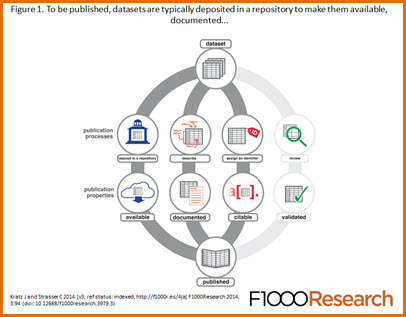Staff in Print – John Kratz and Carly Strasser
CDL is pleased to announce that a new version of Data publication consensus and controversies by John Kratz, a CLIR/DLF Data Curation Fellow at CDL, and UC3 Data Curation Project Manager Carly Strasser, was just published by F1000Research and is available at http://f1000research.com/articles/3-94/v3.
Here is the paper’s abstract:
The movement to bring datasets into the scholarly record as first class research products (validated, preserved, cited, and credited) has been inching forward for some time, but now the pace is quickening. As data publication venues proliferate, sig nificant debate continues over formats, processes, and terminology. Here, we present an overview of data publication initiatives underway and the current conversation, highlighting points of consensus and issues still in contention. Data publication implementations differ in a variety of factors, including the kind of documentation, the location of the documentation relative to the data, and how the data is validated. Publishers may present data as supplemental material to a journal article, with a descriptive “data paper,” or independently. Complicating the situation, different initiatives and communities use the same terms to refer to distinct but overlapping concepts. For instance, the term published means that the data is publicly available and citable to virtually everyone, but it may or may not imply that the data has been peer-reviewed. In turn, what is meant by data peer review is far from defined; standards and processes encompass the full range employed in reviewing the literature, plus some novel variations. Basic data citation is a point of consensus, but the general agreement on the core elements of a dataset citation frays if the data is dynamic or part of a larger set. Even as data publication is being defined, some are looking past publication to other metaphors, notably “data as software,” for solutions to the more stubborn problems.
nificant debate continues over formats, processes, and terminology. Here, we present an overview of data publication initiatives underway and the current conversation, highlighting points of consensus and issues still in contention. Data publication implementations differ in a variety of factors, including the kind of documentation, the location of the documentation relative to the data, and how the data is validated. Publishers may present data as supplemental material to a journal article, with a descriptive “data paper,” or independently. Complicating the situation, different initiatives and communities use the same terms to refer to distinct but overlapping concepts. For instance, the term published means that the data is publicly available and citable to virtually everyone, but it may or may not imply that the data has been peer-reviewed. In turn, what is meant by data peer review is far from defined; standards and processes encompass the full range employed in reviewing the literature, plus some novel variations. Basic data citation is a point of consensus, but the general agreement on the core elements of a dataset citation frays if the data is dynamic or part of a larger set. Even as data publication is being defined, some are looking past publication to other metaphors, notably “data as software,” for solutions to the more stubborn problems.
